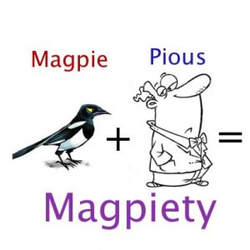Can You Translate a Untranslatable Word?

You can translate any “untranslatable word” if you understand the meaning. Here is an example of an agglutinated word that you will probably never find in a Spanish-English dictionary: magpiety. If you study the meaning of this word you will realize that no even the English definition is complete. Here is the history and see if you agree.
magpiety, n.: talkativeness, garrulity (especially on religious subjects); affected piety. Magpiety was coined in the 19th century as a tongue-in-cheek term to describe that special kind of religious fervor that has more to do with chattering incessantly about it and looking the part than with any hint of genuine religious devotion. British humorist Thomas Hood first used it in a poem about a “pious” Mrs. Cope who appears desperate to get to Church, but along the way she uses many foul words and tries to cheat the driver out of his fare. Not so pious after all.

Magpies are the cheekiest of birds. They love to tease cats, chase other birds, and, above all, talk and talk and talk and talk until nobody wants to listen anymore, which is almost certainly right away. They build untidy nests full of shiny things and seem to be all show with no substance, leading many to snub them as generally obnoxious and sometimes even an ill omen. They are so obnoxious, in fact, that the word has come to refer not just to the brash little birds themselves, but to anybody resembling them—those sorts of people who love to collect useless objects and spew a never-ending stream of chatter without ever really saying anything.
Tacking the powerful piety onto the end of the meaning-rich magpie created a succinct new way to capture a certain type of character.
A direct translation of magpiety as “talkative” would probably suffice in most cases, but the full meaning of the word is more than just being talkative.
How would you translate an equivalent word or phrase in the target language?
Give it a try here and post your comments. Good luck.Next week: What is it called when you stick two words together to make a new one?

 RSS Feed
RSS Feed